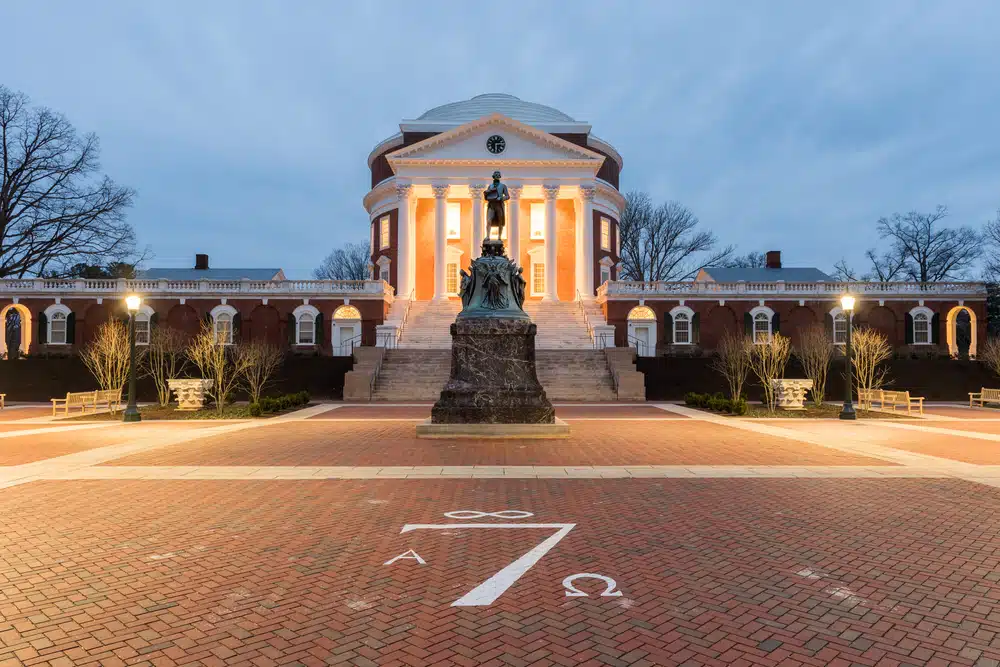University of Virginia Early Action, Early Decision, and Regular Decision Notification Dates Class of 2028
Managing the University of Virginia’s Early Action, Early Decision, and Regular Decision notification dates is key for the Class of 2028. As you begin your college application journey, understanding these dates is crucial for timely and strategic planning.
This guide serves as your roadmap to the important deadlines and decision timelines you need to be aware of. While the process might seem daunting, having this knowledge at your fingertips simplifies your planning. Stay informed and take proactive steps towards your future by keeping up with these essential dates.
University of Virginia Early Action and Early Decision Notification Dates Class of 2028
Early Action (EA) and Early Decision (ED) at the University of Virginia (UVA) present two distinct pathways for prospective students aiming for the Class of 2028. While EA offers an opportunity to receive your admission decision early without the binding commitment, ED, on the other hand, is a binding agreement where you commit to attend UVA if admitted.
UVA has set a specific release date for its Early Action and Early Decision decisions for the Class of 2028. This significant date in the college admissions calendar marks the culmination of a rigorous selection process, both for you as an applicant and for the university.
When Does the University of Virginia Early Action Come Out?
February 15, 2024, is a crucial date for UVA’s Class of 2028 applicants. UVA has strategically chosen this date to give you several months before the traditional May 1 national college decision day. This timeline is especially beneficial if you’re considering multiple college offers or need to visit campuses before making your final decision.
Receiving an Early Action decision from UVA, a prestigious institution, can significantly impact your overall college planning strategy. If you receive a favorable decision, you can expect a sense of great relief and excitement, knowing you have a spot at one of your top-choice schools. However, remember that an Early Action acceptance at UVA is not binding. You’re not obligated to commit immediately and have the freedom to explore other options.
What Time Does the University of Virginia Early Action Come Out?
As of now, UVA has not announced a specific time for releasing Early Action decisions. Stay updated by regularly checking UVA’s admissions website. The absence of a specific time can be anxiety-inducing, as you await one of the most significant notifications of your academic career. In previous years, universities typically released decisions in the afternoon or evening to accommodate different time zones and ensure their admissions offices were ready to handle any immediate inquiries.
Understanding the Early Action decision timing can help you plan your day. You might want to be with family or friends when checking your decision, or you might prefer a quiet, private space to process the news alone. Regardless of the outcome, having a support system is crucial. Remember, a college decision does not define your worth or future success.
As you prepare for university life at UVA, you should focus on attending orientation programs, familiarizing yourself with campus resources, and connecting with future classmates. UVA’s orientation programs provide a comprehensive introduction to university life, combining informational sessions, social events, and academic advising. These programs help you understand UVA’s history, traditions, and values, and guide you in using various student support services.
Take full advantage of UVA’s academic resources, health and wellness facilities, and career services. These resources play a key role in enhancing your academic performance and overall well-being. Also, actively engage in student organizations and clubs. This involvement not only allows you to pursue your interests but also helps in developing leadership and teamwork skills.
Remember, your time at UVA is not just about academics; it’s about embracing new experiences and becoming part of a vibrant community. Stay proactive and open to all the opportunities UVA offers, and you’ll set the stage for a rewarding and memorable university experience.
When Does the University of Virginia Early Decision Come Out?
If you opt for Early Decision at UVA, you’ll receive your admission status on December 15, 2023. Knowing this date ahead of time lets you plan your next steps well before the typical spring decision timeline. Getting an early admission decision helps you focus on your final high school semester without the added stress of waiting for college acceptances. Remember, the Early Decision process at UVA is highly competitive due to the large number of applications from qualified students.
Before deciding on Early Decision, it’s important to understand the commitment involved. If UVA admits you, you must withdraw all other college applications and enroll at UVA. This binding nature of Early Decision makes it crucial for you and your family to be certain about this choice. It’s also essential to understand UVA’s financial aid offerings and ensure they align with your family’s financial planning for college.
What Time Does the University of Virginia Early Decision Come Out?
As of now, UVA hasn’t specified an exact time for releasing Early Decision notifications for the Class of 2028. In the past, UVA typically released these decisions in the evening, Eastern Time. However, you should regularly check both your email and UVA’s admissions website for the latest information on the announcement time. While waiting can be anxiety-inducing, staying patient and prepared for any outcome is important.
Receiving your Early Decision notification is significant. If accepted, it marks the beginning of your journey at a prestigious institution like UVA. If you’re not accepted, remember that it doesn’t reflect your worth or potential. UVA’s admissions process is highly competitive, and not getting admitted Early Decision doesn’t limit your success in other applications or future endeavors.
If UVA defers your Early Decision application to the Regular Decision pool, stay optimistic and consider additional steps to strengthen your application. This might include submitting updated grades, more recommendation letters or a letter of continued interest to show UVA remains a top choice.
For you, waiting for the Early Decision notification is a time to reflect on your high school journey and plan for various outcomes. Regardless of the decision, it’s a chance for growth and learning, preparing you for the next chapter of your academic and personal life.
The early decision notification date at UVA is a milestone in the college admissions calendar. For those who choose this path, it signifies a commitment to a university they are passionate about. While the process can be nerve-wracking, it’s also filled with hope and anticipation. Use this time to prepare for all possible outcomes and remember that your future holds numerous opportunities, regardless of a single college admission decision.
University of Virginia Regular Decision Notification Date Class of 2028
Regular Decision offers high school seniors a more traditional and flexible admissions timeline compared to Early Action or Early Decision. While Early Action and Early Decision require earlier deadlines and a binding commitment in the case of Early Decision, Regular Decision lets you submit your application by January 1st and receive your decision by early April. This timeline has several advantages: it gives you more time to polish your application, secure impressive letters of recommendation, and potentially improve standardized test scores.
When Does the University of Virginia Regular Decision Come Out?
April 1, 2024, is a crucial day for you if you’ve chosen the Regular Decision pathway. UVA strategically selects this date to align with the national deadline for college decisions, May 1st. This one-month window is critical, giving you ample opportunity to compare financial aid packages, revisit campuses, and make an informed decision about where to spend the next four years.
If you’re waiting for your UVA decision, you might feel a mix of excitement and anxiety. UVA practices holistic admissions, meaning they review every part of your application, including grades, test scores, essays, extracurricular activities, and recommendation letters. This comprehensive approach ensures they evaluate you based on your unique story and potential contribution to the UVA community.
What Time Does the University of Virginia Regular Decision Come Out?
In the previous admissions cycle, UVA released Regular Decision results at 5 PM ET. While the exact time for 2024 hasn’t been announced, it’s likely to follow a similar schedule. This timing aims to allow you to be at home with your family or in a comfortable environment when receiving your admission results. It also considers different time zones, making the decision time convenient for applicants across the country and around the world.
The moment UVA releases decisions brings a wide range of emotions. For some, it’s a time of joy and relief, but for others, it may bring disappointment. It’s important to remember that an admission decision doesn’t define your worth or potential. UVA, like many selective institutions, receives far more qualified applications than they can accept. This high level of competition means many talented and deserving students won’t be offered admission.
If you receive a positive decision, the weeks following the announcement are crucial for making your final college choice. UVA, known for its strong academic programs, vibrant student life, and beautiful campus, offers numerous resources to help you decide. These include admitted student days, virtual tours, and access to current students and faculty for questions about life at UVA.
If you aren’t admitted to UVA, take a moment to process your feelings but also remember that there are many paths to success and numerous other colleges where you can thrive and achieve your goals. Having a balanced list of safety, match, and reach schools ensures that you’ll have options when making your final college decision.
The Regular Decision notification date at the University of Virginia is a pivotal event in the college admissions landscape. It marks the culmination of years of hard work and dedication for high school seniors.
Whether celebrating an acceptance or dealing with disappointment, remember that your college journey is just beginning, and a world of opportunities awaits you, no matter where you enroll. As you await your decision, stay focused on your current academic and extracurricular commitments, maintaining the strong performance that made you an outstanding candidate.
How Does the University of Virginia Notify Acceptance?
Becoming familiar with the University of Virginia’s notification dates for Early Action, Early Decision, and Regular Decision for the Class of 2028 is vital in preparing for the next stages of your educational journey.
The University of Virginia (UVA), renowned as one of the United States’ most prestigious public universities, adopts a comprehensive and student-friendly approach to inform applicants about their admission status. Understanding how UVA communicates these critical decisions will help you and your family better prepare for your educational journey’s next steps.
UVA combines modern digital communication with traditional methods to notify applicants. This dual strategy caters to the diverse preferences of applicants and ensures everyone receives this crucial information promptly.
Digital Notification via Online Portal
UVA primarily notifies you of your admission status through its online portal. This portal acts as a centralized hub where you can access all your application-related information in a secure and private environment.
When UVA releases admission decisions, it sends you an email prompt to check the portal. This email alerts you that your decision is available for viewing, ensuring prompt delivery while maintaining your privacy.
The portal is more than just a tool for admission notifications; it also serves as a resource center. Here, you can find detailed information about the next steps after admission, such as housing applications, orientation sessions, and enrollment procedures. The portal may also offer personalized information based on the school or program you’re admitted to, providing a tailored experience to ease your transition to university life.
Traditional Mail
For certain applicants, UVA also sends formal acceptance packages via traditional mail. These packages often include additional university information, welcome materials, and sometimes scholarship announcements.
Receiving a physical acceptance letter is a memorable milestone, symbolizing the culmination of your hard work and dedication throughout high school. It also serves as a tangible keepsake for you and your family.
However, you should note that the mailing process can be slower than digital notifications. Delivery times may vary, especially for international students, who might experience delays compared to their counterparts in the United States.
Managing Expectations and Anxiety
The period leading up to admission notifications is often fraught with anxiety. UVA understands this and strives to make the process as stress-free as possible. The university typically announces decision release dates well in advance, allowing you to mentally prepare for the outcome. UVA’s admissions blog and social media channels also offer updates and words of encouragement during this high-stress period.
It’s crucial to have realistic expectations and prepare for all possible outcomes. Remember, admissions decisions do not define your value or potential. UVA’s holistic admissions process considers a wide range of factors, not just academic achievement. This approach aims to build a diverse and dynamic student body, which means not all qualified applicants are admitted.
Next Steps After Receiving the Decision
The University of Virginia has outlined specific notification dates for the Class of 2028 regarding early action, early decision, and regular decision admissions, guiding applicants on their next steps after receiving their admission decision.
Accepted students will receive comprehensive instructions on how to proceed, including deadlines for housing and enrollment deposits, ensuring a smooth transition into their college journey. For those waitlisted or not admitted, UVA provides resources and guidance on alternative options, like joining the waitlist, exploring transfer opportunities, or reapplying in the next academic cycle. The university’s admissions counselors are available to support you and answer any questions regarding the decision.
In conclusion, the University of Virginia employs a thoughtful and student-centered approach to notifying applicants of their admissions status. Whether through the instant digital portal or the traditional mail system, UVA ensures that each applicant receives their decision efficiently and meaningfully. This process, while nerve-wracking, is an integral step in your journey to higher education, and UVA is committed to making it as smooth and transparent as possible.
Understanding UVA’s Admissions Criteria
The University of Virginia (UVA) is renowned for its selective admissions process aimed at enrolling a diverse and talented student body. This holistic process goes beyond grades and test scores to understand you as a complete individual. UVA’s admissions team scrutinizes each application, looking for students who will excel academically and contribute significantly to the campus community.
UVA’s approach to admissions focuses on balancing your achievements with your potential. The university acknowledges that a strong academic foundation is important, but it’s only part of the picture. They look for how you’ve challenged yourself academically, your intellectual curiosity, and your preparedness for college-level work.
1. Academic Performance and Rigor
Your academic record is crucial at UVA. This includes the difficulty of your high school courses, grades, GPA, and grade trends. Admissions counselors seek students who have tackled challenging courses available at their schools, such as honors, Advanced Placement (AP), or International Baccalaureate (IB) courses. Consistently excelling in these courses shows your capability to thrive in UVA’s demanding academic environment.
However, UVA also appreciates grade improvement over time, demonstrating your resilience and adaptability. This aspect reveals your academic journey and growth potential.
2. Standardized Test Scores
While standardized test scores aren’t the sole factor in admissions decisions, they are part of UVA’s holistic review. Scores from tests like the SAT or ACT offer a standardized academic proficiency measure, aiding in comparing applicants from diverse high schools. UVA understands that these tests are just one indicator of your academic ability and potential.
It’s important for you to know that UVA has adopted test-optional policies recently, particularly in response to the COVID-19 pandemic. If you choose not to submit your scores, it won’t disadvantage you in the admissions process.
3. Essays and Personal Statements
Your essays and personal statements let you shine and show who you are beyond your academic record. UVA’s admissions officers use your writings to gain insights into your personality, experiences, and perspectives. These essays are your chance to demonstrate your writing skills and share your unique story, values, and worldview.
UVA’s essay prompts often encourage reflection on personal growth, challenges overcome, and community contributions. Your responses offer the admissions team a window into your character, motivations, and fit for the UVA community. You should use your essays to speak directly and honestly, giving a clear sense of your individuality and what you can contribute to the UVA campus.
4. Letters of Recommendation
Letters of recommendation are pivotal in the holistic review process. Typically from teachers or school counselors, these letters shed light on your academic abilities, character, and potential contributions to UVA. Effective recommendations provide a narrative about your intellectual curiosity, engagement in learning, and personal qualities like leadership, resilience, and empathy.
When choosing recommenders, pick individuals who know you well and can meaningfully speak to your strengths and potential. These letters add depth and context to the academic and extracurricular information in your application.
5. Demonstrating Fit for UVA’s Community and Values
Finally, UVA seeks students who will fit well into their community and align with the university’s values. This includes a commitment to academic excellence, collaborative spirit, and community service engagement. UVA values diversity and looks for students who will contribute to a rich, vibrant campus culture.
You can demonstrate your fit through your essays, extracurricular activities, and, in some cases, interviews. Active participation in community service, leadership roles, and activities demonstrating a commitment to social justice and inclusivity are highly valued. UVA is not just looking for academically successful students but also those who will enrich the campus community and embody the university’s values.
Becoming familiar with the University of Virginia’s Early Action, Early Decision, and Regular Decision notification dates for the Class of 2028 is a crucial step in the application journey. Understanding these timelines is just the beginning; as a prospective student, you should approach your application with the goal of showcasing a comprehensive view of your identity, achievements, and future goals at UVA and beyond.
This thorough and holistic review process at UVA ensures that the students selected are not only academically equipped but also poised to enrich the diverse and vibrant community that epitomizes this esteemed institution.
How Can You Increase Your Chances of Getting into UVA?
Gaining admission to the University of Virginia (UVA) requires more than high academic scores; it’s a holistic process assessing your overall profile. UVA looks for students who excel academically and contribute meaningfully to their communities. It is known for its rigorous academics and vibrant campus life.
Understanding Academic Expectations
At UVA, a strong academic record forms the foundation of a successful application. This means not only achieving high grades but also undertaking challenging courses. UVA admissions officers consider the difficulty of your coursework relative to what your school offers.
Enrolling in advanced placement (AP) classes, International Baccalaureate (IB) courses, or honors classes can significantly boost your application, indicating your readiness for college-level work and commitment to academic excellence.
Grades are important, but so are standardized test scores. While becoming optional at many universities, they still play a role at UVA. High SAT or ACT scores can give you an edge, especially when they complement your high school performance. If your test scores don’t reflect your abilities, consider retaking these exams. UVA follows a superscoring policy, considering the highest score from each section across all test dates.
Showcasing Extracurricular Involvement
UVA values students who engage actively in extracurricular activities. Depth and commitment in your involvement matter more than just participation. You should demonstrate leadership or founding roles in clubs, sustained involvement in activities, or awards in your interest areas. UVA seeks quality and passion in your activities, whether it’s community service, sports teams, or artistic pursuits like music or theater. These activities should reflect your interests and values, showing your potential to contribute to the UVA community.
Emphasizing Leadership and Initiative
Leadership is crucial in UVA’s applicant assessment. This can be leading a team, organizing events, or starting new initiatives in your school or community. Leadership roles demonstrate your ability to handle responsibilities, work collaboratively, and impact positively. Whether you’re a sports team captain, student organization president, or volunteer coordinator, these roles highlight your leadership qualities.
If you have unique experiences like starting a business, conducting research, or significant work experiences, highlight them in your application. These experiences show self-motivation, a willingness to challenge yourself, and innovative thinking.
Community Involvement and Personal Qualities
UVA highly values community service and engagement. Long-term involvement in community projects shows empathy, social responsibility, and a commitment to others’ well-being. Whether through regular volunteering, mission trips, or community initiatives, these experiences demonstrate your dedication to making a difference.
Your personal qualities are equally important. UVA values students who show resilience, curiosity, and integrity. They look for students who learn and grow from challenges, who are eager to explore, and who act ethically. Your personal essays and recommendation letters are great ways to highlight these traits.
Crafting a Compelling Application
Your application needs to be compelling, particularly your essays. They are your opportunity to speak directly to the admissions committee, showing who you are beyond grades and scores. Your essays should be reflective, well-written, and authentic, telling your story and revealing your character, experiences, and aspirations.
Choose recommenders who know you well for your letters of recommendation. Teachers, counselors, or mentors who can attest to your academic abilities and personal qualities, providing specific examples of your achievements and character, will be most effective.
Gaining admission to UVA involves combining strong academic performance, meaningful extracurricular involvement, demonstrated leadership, community engagement, and effective communication of your story. It’s about showcasing not just what you’ve achieved but who you are and how you will contribute to the UVA community. With dedication, self-awareness, and authenticity, you can build a compelling application that aligns with UVA’s values and expectations.
The Role of Alumni Interviews in UVA’s Admission Process
Upon familiarizing yourself with the University of Virginia’s Early Action, Early Decision, and Regular Decision notification dates for the Class of 2028, it becomes crucial to recognize other aspects that enhance your application. At UVA, a profound understanding of candidates extends beyond essays and transcripts.
Alumni interviews, although not mandatory, present an invaluable opportunity to add a personal touch to your application and allow the university to gain a more comprehensive view of your suitability for their community.
Understanding the Purpose of Alumni Interviews
Alumni interviews at UVA aim to be conversational and informative. Rather than formal assessments, these interviews offer mutual understanding. They let UVA, through its alumni, assess your interpersonal skills, passion, and fit for the community. Conversely, you get a chance to learn about the university from someone who has experienced it firsthand.
UVA alumni, volunteering their time, conducted these interviews. They are spread globally, accommodating students from various regions. These alumni understand UVA’s ethos and seek students who excel academically and embody the university’s values and spirit.
Impact of Alumni Interviews on Admissions Decisions
Alumni interviews supplement UVA’s admissions process rather than deciding it. They add context to your application, particularly when your paperwork leaves questions about your personality or fit for UVA.
A strong performance in an interview can positively impact your application. It can showcase your enthusiasm, communication skills, and genuine interest in UVA. Conversely, a lackluster interview might raise concerns about your fitness or readiness for college. While not the sole deciding element, these interviews can influence a closely contested admissions decision.
Preparing for a UVA Alumni Interview
Preparation is crucial for a successful UVA alumni interview. You should treat these interviews as important conversations about your future. Researching the university thoroughly, including its history, programs, campus culture, and values, is advisable. Knowing unique aspects like UVA’s honor code and student-led initiatives can provide good talking points to show your knowledge and interest.
You should also be ready to discuss your personal experiences, achievements, challenges, and aspirations. Aligning these with UVA’s ethos is important. It’s crucial to articulate why UVA is the right fit for you and how you can contribute to the university community.
Preparing questions for your interviewer is beneficial too. Your questions should delve into the interviewer’s personal experiences at UVA and seek advice on making the most of university life.
Tips for a Successful Alumni Interview
- Be Genuine: Authenticity matters in an interview. Be honest about your achievements, interests, and reasons for applying to UVA.
- Practice Active Listening: Engage with your interviewer’s questions and comments. Show that you are attentive and interested.
- Dress Appropriately: While the interview might be informal, neat dressing shows you take the opportunity seriously.
- Follow-up: Sending a thank-you note after the interview demonstrates your appreciation and reinforces your interest in UVA.
After the Interview: What to Expect
After your interview, the alumni interviewer will typically write a report for UVA’s admissions office, summarizing the conversation and their impressions of you. This report joins your application file and gets reviewed with your other materials.
It’s crucial to remember that not having an alumni interview won’t hurt your application. Since these interviews depend on alumni availability, not all applicants get this chance. However, when available, it’s a valuable opportunity to strengthen your application and personally connect with the UVA community.
Alumni interviews at UVA add a unique aspect to the admissions process. They allow you to present yourself more personally and let the university further assess prospective students’ compatibility. While not overriding academic qualifications and other application parts, they certainly add depth to your profile. Excelling in these interviews can be a step closer to achieving your goals at UVA.
Navigating the Financial Aid Process at UVA
Navigating the financial aid process at the University of Virginia (UVA) is a crucial step for many students. It makes their college decision more feasible and informed. You need to understand the types of financial aid available, the application process, and how UVA determines financial aid packages. This understanding can significantly impact your ability to attend and succeed at UVA. The university’s comprehensive financial aid programs reflect its commitment to making education accessible to everyone.
Types of Financial Aid Offered at UVA
UVA offers a range of financial aid options to meet the diverse needs of its student body. These options include scholarships, grants, loans, and work-study programs. Each option comes with its own criteria and benefits.
1. Scholarships
UVA does not require you to repay scholarships. The university offers a variety of scholarships based on merit, financial need, or a combination of both. UVA awards merit-based scholarships to students who show exceptional academic or extracurricular achievements. Need-based scholarships depend on your financial situation, as assessed by the Free Application for Federal Student Aid (FAFSA) and the CSS Profile.
UVA also offers program-specific scholarships. These scholarships target students in certain fields of study or from particular backgrounds. For example, the Jefferson Scholars Foundation provides full scholarships to outstanding undergraduate students based on leadership, scholarship, and citizenship. Other scholarships support students from underrepresented communities or those who have overcome significant challenges.
2. Grants
You don’t need to repay grants, which are typically need-based. They are a crucial part of UVA’s commitment to affordability. UVA provides several grants, including the AccessUVA Financial Aid Program. This program ensures that the cost of attending UVA is not a barrier to prospective students. You can also apply for federal and state grants, like the Pell Grant and the Commonwealth Award if you’re eligible.
The amount and availability of grants depend on your financial need, fund availability, and changes in federal and state funding. Apply for financial aid early to maximize your chances of receiving grants.
3. Loans
Loans are a part of many students’ financial aid packages, though they are less preferable than scholarships and grants. You must repay loans, typically after graduation. UVA participates in several loan programs, including federal student loans. These loans often have lower interest rates and more flexible repayment options than private loans.
It’s important to understand the terms and conditions of any loans you accept. For example, federal student loans include subsidized and unsubsidized loans, each with its own eligibility criteria and interest terms. Subsidized loans don’t accrue interest while you’re in school, but unsubsidized loans do.
4. Work-Study Programs
The Federal Work-Study Program at UVA offers part-time employment for students with financial need. It allows you to earn money to help pay for education expenses. Work-study jobs often relate to your course of study or community service and can be a great way to gain work experience while contributing to your education costs.
Work-study positions vary in hours, pay, and responsibilities. Some jobs are on-campus, while others are off-campus, typically with non-profit organizations or public agencies. You can find work-study job listings through UVA’s student employment website.
Applying for Financial Aid at UVA
The financial aid application process at UVA involves several steps. Be thorough and timely with your applications.
1. FAFSA and CSS Profile
Your first step is to complete the FAFSA. It determines your eligibility for federal and state financial aid, as well as certain types of institutional aid. UVA also requires the CSS Profile for some types of aid. This form provides a more detailed analysis of your family’s financial situation.
Both the FAFSA and CSS Profile are available starting October 1st of the year before you plan to attend college. Submit these forms as early as possible, as some aid is awarded on a first-come, first-served basis.
2. Deadlines and Documentation
Paying attention to deadlines is critical. UVA has specific deadlines for submitting the FAFSA and CSS Profile, typically in the early winter of the year you plan to enroll.
You may need to provide additional documentation to verify the information submitted. This can include tax returns, W-2 forms, and other financial documents. The UVA Financial Aid Office might request this documentation for the verification process.
Understanding Your Financial Aid Offer
UVA will provide an offer of financial aid after reviewing your application. This offer may include scholarships, grants, loans, and work-study. Review this offer carefully with your family and understand each component.
The offer outlines the total cost of attendance, including tuition, fees, room, board, and estimated personal expenses. It details the types and amounts of aid offered to meet those costs. If the offered aid doesn’t cover the full cost, consider other options, like additional loans or external scholarships.
Dealing with the financial aid process at UVA requires planning, attention to detail, and adherence to deadlines. By understanding the available types of aid and the application process, you can make informed decisions about funding your education. UVA’s commitment to affordability and access ensures a diverse range of students can pursue their academic goals without financial barriers.
Post-Admission Steps: Next Steps After Acceptance
Once you are informed about the University of Virginia’s notification dates for Early Action, Early Decision, and Regular Decision for the Class of 2028, it’s essential to focus on the next steps. Receiving an acceptance letter from the University of Virginia marks the beginning of an exciting journey as a UVA student.
The period following your acceptance is crucial, involving several important steps that lay the foundation for your college experience. Here, we will help you go through these vital post-admission steps, ensuring a smooth transition to university life.
Housing Applications
Upon receiving your acceptance letter, it’s important to think about where you’ll live. UVA offers various housing options to cater to different needs and preferences.
- Exploring on-campus housing: Living on-campus at UVA immerses you in a vibrant college community. To secure a spot, you need to complete a housing application, typically found on the university’s housing website. Remember, on-campus housing is often assigned on a first-come, first-served basis, so be mindful of deadlines.
- Choosing a residence hall: UVA’s residence halls come in different styles and amenities. When choosing, consider factors like location, cost, and community type. If you’re interested in a specialized living experience, explore themed housing options like living-learning communities or language houses.
- Understanding the housing contract: Make sure you fully understand your housing contract’s terms, including room change policies, meal plans, and cancellation fees, to avoid surprises later on.
Enrollment Deposits
Securing your spot at UVA requires submitting an enrollment deposit, a crucial step that confirms your intention to attend.
- The significance of the enrollment deposit: This non-refundable deposit is credited towards your tuition, symbolizing your commitment to accepting UVA’s admission offer.
- Deadline and payment methods: Be aware of the deposit deadline, as missing it could mean losing your place at the university. For payment methods, refer to the university’s admissions website, which may include online payments, checks, or bank transfers.
Course Registration
Course registration is an exciting step in shaping your academic journey at UVA. It requires thoughtful consideration to align your courses with your academic goals and interests.
- Understanding degree requirements: Familiarize yourself with your degree’s core courses, major-specific classes, and electives. UVA’s academic advisors can guide you in structuring your course load each semester.
- Navigating the registration process: UVA typically conducts course registration through an online portal. Be aware of registration windows and deadlines. Prepare a list of preferred courses and backups, as popular classes may fill up quickly.
Orientation Activities
Orientation is a key part of integrating into the UVA community, an opportunity to acclimate to college life, meet other students and learn about campus resources.
- Participating in orientation programs: UVA’s orientation programs are designed to ease new students’ transition. They include campus tours, academic advising sessions, and social events, helping you familiarize yourself with the campus, and student services, and start building your social network.
- Engaging in academic and social workshops: Orientation typically features various workshops, from academic success strategies to campus safety. Actively participating in these sessions provides valuable information for navigating your first year at UVA.
Finalizing Financial Aid
If you’ve applied for financial aid, finalizing this aspect is a crucial post-acceptance step.
- Review and accept your financial aid package: Carefully review your financial aid offer, noting the types of aid like scholarships, grants, loans, and work-study options. Contact UVA’s financial aid office for any clarifications.
- Completing additional paperwork: Certain forms of financial aid may require additional steps, such as loan entrance counseling or signing a Master Promissory Note. Complete these requirements promptly to secure your financial aid.
Health and Wellness Preparations
An often-overlooked but vital post-admission step is preparing for your health and wellness.
- Health insurance and immunizations: UVA requires students to have health insurance and up-to-date immunizations. Ensure you meet these health requirements and submit the necessary documentation or waivers before the deadline.
- Familiarize yourself with campus health resources: Get to know the health and wellness services at UVA, including the student health center, counseling services, and wellness programs. Being aware of these resources can be immensely beneficial as you start your college journey.
Getting Involved in Campus Life
Finally, explore the wide range of extracurricular opportunities available at UVA.
- Clubs and organizations: UVA boasts a diverse array of student clubs and organizations. Whether your interest lies in sports, arts, academic clubs, or social activism, there’s a group for you.
- Planning for involvement: Visit the university’s website or attend club fairs during orientation to discover how you can get involved. Engaging in extracurricular activities is a fantastic way to meet people, develop skills, and enrich your college experience.
By following these post-admission steps, you’ll set yourself up for a successful and fulfilling experience at the University of Virginia. Each step is a crucial part of your journey, helping you become an integral part of the UVA community.
Can You Get Rejected in UVA Early Decision?
Upon familiarizing yourself with the Early Action, Early Decision, and Regular Decision notification dates for the University of Virginia’s Class of 2028, it becomes vital to comprehend the implications of each outcome. In the Early Decision (ED) program, where your attendance is binding if accepted, outcomes like acceptance, deferral, waitlist, or rejection each uniquely impact your college application path.
Understanding Early Decision Outcomes
When you apply to UVA under Early Decision, you make a binding commitment to enroll if accepted and withdraw applications from other schools. Make this decision carefully, as it ties you to UVA upon acceptance. The most favorable outcome, of course, is acceptance, ending your college search and allowing you to prepare for your future at UVA.
However, not every Early Decision application ends in acceptance. Sometimes, UVA might defer your application. A deferral means the admissions committee recognizes your potential but wants to reconsider your application alongside the Regular Decision pool. Being deferred isn’t a denial; it’s a second chance for admission consideration. If deferred, update your application with any new achievements or information that might strengthen your case.
Another outcome is the waitlist, which happens when you meet the admission criteria, but UVA has reached its capacity. If you’re on the waitlist, UVA may offer you a spot if it becomes available. The waitlist period can be uncertain, as you won’t know for sure if UVA will eventually offer you a place.
Dealing with Early Decision Rejection
Rejection is a tough, yet possible outcome of the Early Decision process. If UVA rejects your ED application, they have decided not to offer you a spot in the incoming class. While rejection is disheartening, remember that it doesn’t reflect on your worth or potential. College admissions are competitive, with many influencing factors.
If rejected, it’s vital to have a backup plan. This involves considering other colleges where you’ve applied or will apply under Regular Decision. Reassess your college list to include a range of schools — reach, match, and safety. Focus on completing your other applications, possibly refining essays and application materials based on what you learned from the ED process.
Moving Forward After Early Decision
Regardless of your Early Decision outcome, staying positive and proactive is crucial. If accepted, celebrate and start preparing for your next educational chapter. If deferred or waitlisted, continue showing interest in UVA while focusing on other college applications. If facing rejection, see it as an opportunity to explore other exciting opportunities and find a college that’s the right fit for you.
Early Decision is one part of the larger college admissions process. It offers early resolution for some, while for others, it’s a stepping stone to different opportunities. Applying for Early Decision can teach valuable lessons in decision-making, resilience, and adaptability — qualities that will benefit you in college and beyond.
Conclusion
For the Class of 2028, the University of Virginia has outlined specific notification dates for early action, early decision, and regular decision admission pathways, providing applicants with clear deadlines and a structured timeline for their application process. By understanding these timelines and preparing accordingly, students can navigate the admissions process with confidence and clarity.
In addition to these pathways, UVA provides comprehensive support and resources to guide applicants throughout their journey. It’s important for students to stay updated with the latest information and utilize available resources for a successful application. Ultimately, a well-prepared and informed approach will enhance the chances of becoming a part of the vibrant UVA community.

















































